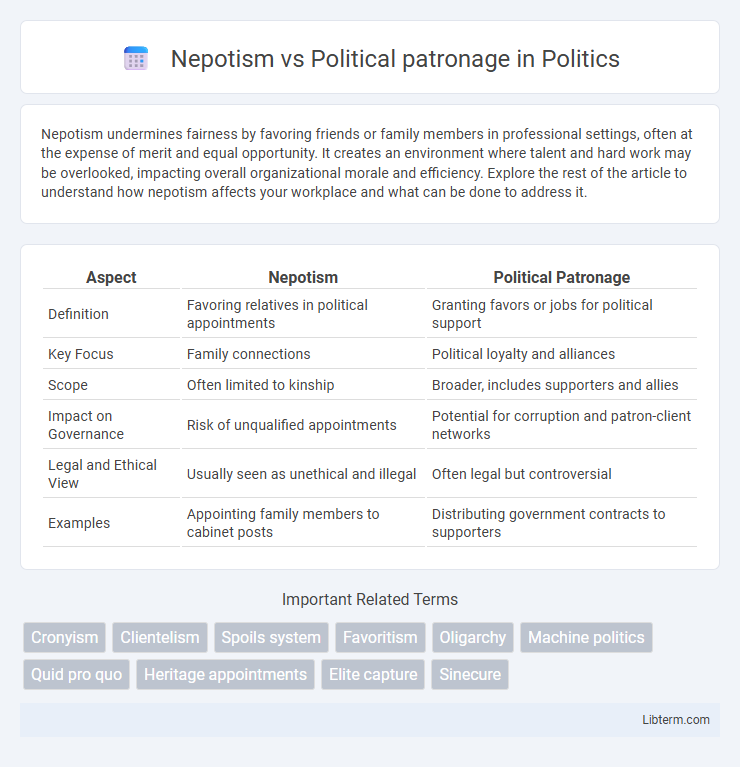Nepotism undermines fairness by favoring friends or family members in professional settings, often at the expense of merit and equal opportunity. It creates an environment where talent and hard work may be overlooked, impacting overall organizational morale and efficiency. Explore the rest of the article to understand how nepotism affects your workplace and what can be done to address it.
Table of Comparison
| Aspect | Nepotism | Political Patronage |
|---|---|---|
| Definition | Favoring relatives in political appointments | Granting favors or jobs for political support |
| Key Focus | Family connections | Political loyalty and alliances |
| Scope | Often limited to kinship | Broader, includes supporters and allies |
| Impact on Governance | Risk of unqualified appointments | Potential for corruption and patron-client networks |
| Legal and Ethical View | Usually seen as unethical and illegal | Often legal but controversial |
| Examples | Appointing family members to cabinet posts | Distributing government contracts to supporters |
Understanding Nepotism: Definition and Origins
Nepotism refers to the practice of favoring relatives or close friends, especially by giving them jobs or other advantages, regardless of their qualifications. The term originates from the Latin word "nepos," meaning nephew or grandson, historically associated with Popes appointing relatives to positions of power. Understanding nepotism involves recognizing its roots in personal bias and familial loyalty, distinguishing it from broader political patronage where favors are granted to supporters or allies based on political connections.
Political Patronage: Meaning and Historical Context
Political patronage refers to the practice where political leaders grant jobs, contracts, or favors to supporters, friends, or allies as a reward for loyalty. Historically, this system has shaped political landscapes worldwide, notably during the 19th-century American "spoils system" under President Andrew Jackson, which institutionalized the distribution of government positions based on partisan allegiance. Political patronage often influences governance and public administration by intertwining political support with the allocation of official resources and appointments.
Key Differences Between Nepotism and Political Patronage
Nepotism involves favoritism granted to relatives or close family members, often leading to unqualified individuals occupying positions due to personal ties. Political patronage, by contrast, extends beyond family to include supporters, allies, or party members rewarded with jobs or favors for their loyalty and assistance. While nepotism centers on blood relations, political patronage is a broader practice tied to political allegiance and influence.
The Role of Family Ties in Nepotism
Family ties serve as the cornerstone of nepotism, influencing hiring decisions and promotions within organizations by prioritizing relatives regardless of merit. This practice often leads to diminished organizational efficiency and fosters environments susceptible to favoritism and conflict of interest. In contrast, political patronage extends beyond family connections to reward loyalty and support within political networks, highlighting a broader spectrum of influence than strictly kinship-based favoritism.
Political Loyalty and Patronage Networks
Nepotism involves favoritism based on family ties, while political patronage extends loyalty through a broader network of supporters and allies. Political loyalty is maintained by allocating resources and positions to trusted individuals within patronage networks, reinforcing power structures. These networks function as mechanisms to secure ongoing support and stabilize leadership in political systems.
Impact on Governance and Public Trust
Nepotism undermines governance by promoting unqualified family members to key positions, which erodes meritocracy and reduces institutional efficiency. Political patronage, while often used to build loyalty, can lead to favoritism and corruption, weakening accountability and public confidence in government institutions. Both practices diminish public trust by fostering perceptions of injustice and unequal access to resources, ultimately impairing democratic processes and service delivery.
Legal and Ethical Perspectives
Nepotism involves favoring relatives in employment or appointments, often challenging legal frameworks that mandate merit-based selection and equal opportunity, thereby risking violations of anti-discrimination laws. Political patronage, while legally permissible in some jurisdictions, raises ethical concerns as it prioritizes loyalty over competence, potentially undermining public trust and governance transparency. Both practices blur the lines between legal compliance and ethical integrity, prompting ongoing debates about accountability and fairness in public administration.
Real-World Examples: Case Studies from Around the World
Nepotism in Italy's political landscape often sees family members securing influential posts, exemplified by the Berlusconi dynasty's reach within government and media sectors. In contrast, political patronage is vividly demonstrated in the Philippines, where elected officials distribute government contracts and jobs to loyal supporters to consolidate power, impacting governance and public resource allocation. Both practices undermine meritocracy but differ in mechanics--nepotism centers on kinship ties, while political patronage relies on reciprocal support networks across broader political bases.
Reforms and Strategies to Combat Corruption
Reforms to combat nepotism and political patronage focus on enhancing transparency through strict enforcement of merit-based recruitment and promotion systems in public offices. Implementing robust anti-corruption agencies with independent oversight, alongside digital governance tools, reduces discretionary power and curbs favoritism. Strategies also emphasize legal frameworks that criminalize favoritism, whistleblower protections, and civic engagement to hold public officials accountable.
The Future of Meritocracy in Politics
Nepotism and political patronage challenge the future of meritocracy in politics by prioritizing personal connections over qualifications and competence. These practices undermine democratic principles by limiting opportunities for talented individuals without influential networks, potentially leading to inefficiency and corruption. Promoting transparent merit-based selection processes and institutional reforms is crucial to restoring public trust and ensuring effective governance.
Nepotism Infographic

 libterm.com
libterm.com